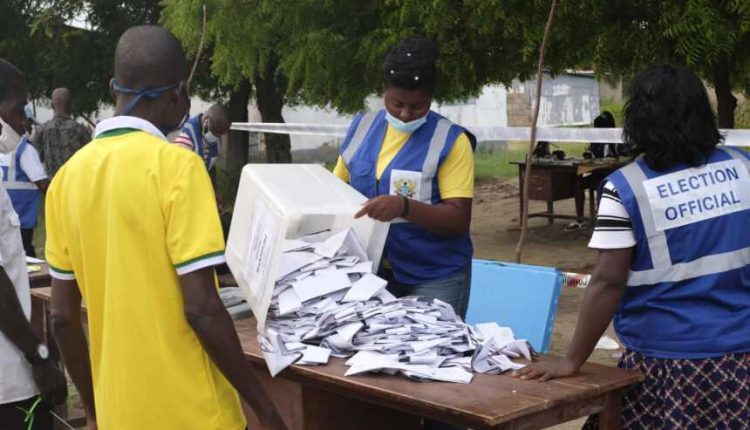EXPLAINER: Breaking Down Ghana’s 50%+1 Rule
In Ghana, a candidate vying for the presidency must secure more than 50% of the total valid votes cast to be declared the outright winner.
Known as the “50%+1 rule”, this principle is enshrined in Article 63 of the 1992 Constitution.
It is a key pillar of Ghana’s electoral system, designed to ensure that the president-elect commands the support of the majority of the electorate, promoting legitimacy, inclusivity, and national unity.
This rule has been tested and proven instrumental in several election cycles.
It has contributed to Ghana’s reputation as a stable democracy in West Africa, where peaceful power transfer has become the norm despite the region’s history of political instability.
How the Rule Operates
The 50%+1 rule comes into play when the votes cast in a presidential election are tallied. If no candidate secures more than half of the total valid votes, a runoff election is triggered.
The runoff, held within 21 days of the initial election, involves only the top two candidates from the first round.
This ensures that the ultimate winner has a clear mandate from the majority of voters.
For example, in the 2000 presidential elections, none of the candidates achieved the required majority in the first round.
John Agyekum Kufuor of the New Patriotic Party (NPP) faced John Atta Mills of the National Democratic Congress (NDC) in a runoff.
Kufuor emerged victorious with 56.9% of the votes, underscoring the effectiveness of the rule in delivering a decisive winner.
Similarly, in 2008, a runoff election was necessary after Nana Addo Dankwa Akufo-Addo of the NPP and John Atta Mills of the NDC failed to secure the majority in the first round.
Mills eventually won the presidency with 50.23% of the votes in the second round.
Global Comparisons: How Ghana’s Rule Stands Out
While Ghana’s 50%+1 rule ensures majority rule, different countries adopt varying electoral systems to achieve legitimacy in leadership.
Comparing Ghana’s rule with other nations reveals its distinctiveness and democratic intent:
France: Two-Round Presidential Elections
France’s presidential election system mirrors Ghana’s in some ways.
If no candidate secures an absolute majority in the first round, a second round is held between the top two contenders.
This two-round system guarantees that the eventual winner has a broad mandate, similar to Ghana.
Nigeria: Majority and Geographic Spread Requirement
In neighbouring Nigeria, the requirements for presidential victory are more complex.
A candidate must win the majority of the national vote and secure at least 25% of the votes in at least two-thirds of the 36 states and the Federal Capital Territory.
This system ensures both majority rule and regional representation, unlike Ghana’s simpler, majority-focused approach.
United States: The Electoral College System
The U.S. uses an Electoral College system, where the presidency is decided by electors rather than a direct popular vote.
This system has led to cases where candidates win the presidency without securing the popular vote, as seen in the 2000 and 2016 elections.
Ghana’s rule avoids such discrepancies by making the popular vote the sole determinant of the presidency.
United Kingdom: Parliamentary System
The UK operates under a parliamentary system where general elections determine the composition of Parliament, and the leader of the majority party becomes Prime Minister.
There is no requirement for a candidate to win a majority of votes at the national level, contrasting sharply with Ghana’s emphasis on direct majority support for the president.
Benefits of the 50%+1 Rule
The 50%+1 rule fosters political stability and inclusivity in Ghana’s democracy.
By requiring a candidate to secure a majority, it prevents the scenario where a leader assumes office with weak support from a fragmented electorate.
It also compels presidential hopefuls to campaign across the entire nation, appealing to voters in diverse regions rather than focusing solely on traditional strongholds.
This system has contributed to Ghana’s ability to maintain peaceful elections and transitions of power, even when results are hotly contested.
For instance, in 2012, the presidential election results were disputed in court, but the constitutional framework ensured that the process remained orderly and credible.
Challenges of the 50%+1 Rule
Despite its benefits, the rule is not without challenges.
Runoff elections can be costly and time-consuming, putting additional strain on the Electoral Commission and other stakeholders.
Moreover, voter fatigue may result in lower turnout during the second round.
Additionally, the rule sometimes leads to heightened political tensions during the runoff period.
In such cases, the stakes are raised significantly, and losing parties may find it harder to accept the results, as seen in some close elections.
A Model for African Democracy
Ghana’s 50%+1 rule has proven to be a robust mechanism for electing presidents in a manner that reflects the will of the majority.
While it shares similarities with electoral systems in France and other nations, its straightforward approach and emphasis on inclusivity set it apart.
As Ghana continues to strengthen its democratic institutions, the 50%+1 rule remains a cornerstone of its electoral system.
It not only ensures legitimacy for elected leaders but also serves as a model for other African nations seeking to build stable and inclusive democracies.


